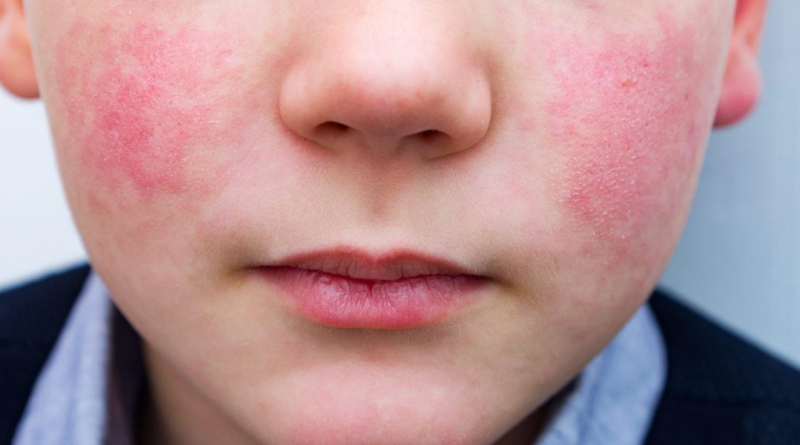Parvovirus B19 is spreading across the U.S. What to know about ‘slapped cheek’ disease
If your child comes home with ruddy cheeks this back-to-school season, their flushed appearance may be due to something other than having had recess in the late-summer heat. They may be infected with parvovirus B19, a disease spreading nationwide that causes a “slapped cheek” rash in children.
The Centers for Disease Control and Prevention (CDC) last week issued a health advisory on the seasonal respiratory virus, also called fifth disease or erythema infectiosum. While the virus isn’t under routine surveillance like COVID-19, the CDC warned the public of increasing viral activity in the U.S. on the heels of “unusually high numbers of cases” in Europe earlier this year.
Clinical specimens have yielded an increase in positive tests for parvovirus B19, the CDC said. In June, the proportion of people whose lab results indicated recent infection was 10%. By comparison, that proportion had been below 3% from 2022–2024. Children ages 5 to 9 showed the greatest increase, from 15% from 2022–24 to 40% this past June.
The prevalence of parvovirus B19 in pooled plasma samples from an unspecified “large commercial laboratory” increased from 1.5% in December to 19.9% in June, the CDC said. In addition, the agency has received reports of complications associated with the virus among pregnant people and those with sickle cell disease.
Because minor parvovirus B19 outbreaks occur in the U.S. every three to four years, per the CDC, it’s unclear whether the coronavirus pandemic may have played a role in the latest uptick in cases. Infections tend to circulate in the late winter, spring, and early summer, but you can catch the virus any time of year.
How does parvovirus B19 spread?
Chances are you’ve already been exposed to the virus in your lifetime. Roughly half of adults have detectable antibodies by the age of 20, according to the CDC, and more than 70% have them by the time they turn 40. While no parvovirus B19 vaccine exists, these antibodies may help protect you against reinfection.
Like the common cold, parvovirus B19 spreads from person to person through respiratory droplets including sputum, saliva, and nasal mucus. You’re also at risk if you touch an item that has the virus on it. Practicing basic public health hygiene such as washing your hands, covering your mouth when you cough, wearing a mask in crowded settings, and staying home when you’re sick can help prevent disease spread. Don’t forget to disinfect frequently touched surfaces such as doorknobs, countertops, and light switches.
Parvovirus B19 can also spread through blood or blood products, though infection through transfusion is rare. In addition, pregnant people who are infected can spread the virus to their unborn child. When this happens early in a pregnancy, the risk of miscarriage increases slightly, the CDC says. In some cases, the fetus may become anemic. If you’re expecting, the virus likely won’t impact your pregnancy—especially if you’ve been previously infected—but be sure to let your doctor know if you think you’ve been exposed.
Because parvovirus B19 is most common among school-age children, teachers, day care staff, and others who work with children have heightened occupational risk. The CDC estimates 20% to 50% of susceptible students and staff become infected during school outbreaks. About half of susceptible people will become infected when a member of their household is ill.

Md Saiful Islam Khan—Getty Images
What are the symptoms of parvovirus B19?
You may have unknowingly had the virus, as some people are asymptomatic. Others may show these mild symptoms, depending on their age:
- Cough
- Fever
- Headache
- Joint pain/swelling (more common in adults, particularly women)
- Rashes (more common among children)
- Sore throat
Symptoms usually appear in two phases, according to the CDC. About a week after infection, when a patient is most contagious, they may display cold-like symptoms lasting five days. Seven to 10 days later, children may develop a sometimes-itchy rash on their cheeks that can also appear on the arms, back, chest, legs, and buttocks, and may come and go for several weeks. Adults tend to experience joint pain during this second phase, which can manifest in the feet, hands, and knees and may last weeks, months, or longer.
Once a patient develops a rash and/or joint pain, they’re no longer contagious, the CDC says. If they feel well enough to do so, they may safely return to work or school.
How is parvovirus B19 diagnosed and treated?
Confirming you have parvovirus isn’t as simple as getting a strep test. Neither is it necessary unless you’re pregnant or at high risk of complications. Ask your doctor whether a blood test to detect parvovirus B19 antibodies is right for you.
Just as there’s no vaccine for the virus, there is no treatment. Over-the-counter medication may be used to treat cold-like symptoms. Due to the risk of a rare illness, called Reye’s syndrome, following a viral infection, the National Institute of Neurological Disorders and Stroke discourages giving aspirin to children.
In otherwise healthy adults and children, parvovirus B19 is often mild and ends in complete recovery. However, people with the following conditions may be at increased risk of complications:
- Blood disorders such as sickle cell disease and thalassemia
- HIV infection
- Leukemia or other cancers
- Organ transplant
Can you get parvovirus B19 from a pet?
No, this disease infects only people, which is why it’s formally called human parvovirus B19. In turn, you can’t pass the disease to your pet. Other parvoviruses, however, can infect animals. Canine parvovirus type 2, for example, attacks the white blood cells and gastrointestinal tracts of dogs, wolves, foxes, and coyotes, according to the American Veterinary Medical Association.
For more on infectious diseases:
Subscribe to Well Adjusted, our newsletter full of simple strategies to work smarter and live better, from the Fortune Well team. Sign up for free today.



